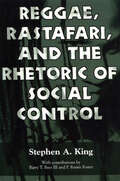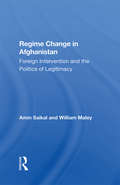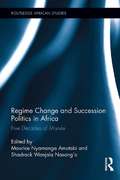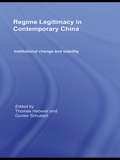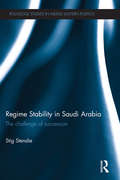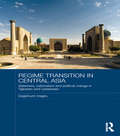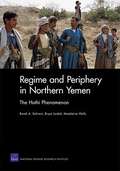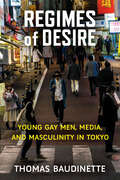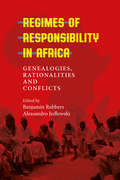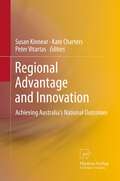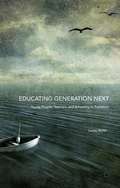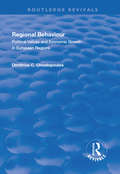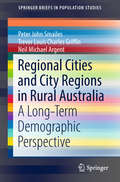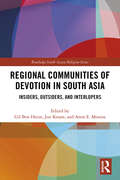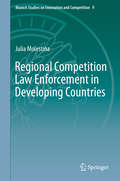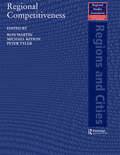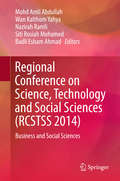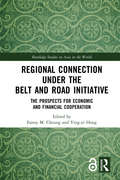- Table View
- List View
Reggae, Rastafari, and the Rhetoric of Social Control
by Stephen A. KingWho changed Bob Marley’s famous peace-and-love anthem into “Come to Jamaica and feel all right?” When did the Rastafarian fighting white colonial power become the smiling Rastaman spreading beach towels for American tourists? Drawing on research in social movement theory and protest music, Reggae, Rastafari, and the Rhetoric of Social Control traces the history and rise of reggae and the story of how an island nation commandeered the music to fashion an image and entice tourists. Visitors to Jamaica are often unaware that reggae was a revolutionary music rooted in the suffering of Jamaica’s poor. Rastafarians were once a target of police harassment and public condemnation. Now the music is a marketing tool, and the Rastafarians are no longer a “violent counterculture” but an important symbol of Jamaica’s new cultural heritage. This book attempts to explain how the Jamaican establishment’s strategies of social control influenced the evolutionary direction of both the music and the Rastafarian movement. From 1959 to 1971, Jamaica’s popular music became identified with the Rastafarians, a social movement that gave voice to the country’s poor black communities. In response to this challenge, the Jamaican government banned politically controversial reggae songs from the airwaves and jailed or deported Rastafarian leaders. Yet when reggae became internationally popular in the 1970s, divisions among Rastafarians grew wider, spawning a number of pseudo-Rastafarians who embraced only the external symbolism of this worldwide religion. Exploiting this opportunity, Jamaica’s new Prime Minister, Michael Manley, brought Rastafarian political imagery and themes into the mainstream. Eventually, reggae and Rastafari evolved into Jamaica’s chief cultural commodities and tourist attractions.
Regime Change In Afghanistan: Foreign Intervention And The Politics Of Legitimacy
by Amin Saikal William MaleyThis book is a study of regime change in an underdeveloped country with a weak state and strong autonomous social organizations. Regime change is in many countries a traumatic and disruptive experience, but few countries have paid as high a cost to retain traditionally accepted relationships of authority as has Afghanistan since the communist coup
Regime Change and Succession Politics in Africa: Five Decades of Misrule (Routledge African Studies #9)
by Maurice Nyamanga Amutabi Shadrack Wanjala Nasong'OBringing together scholars from a wide array of disciplines - including anthropology, economics, history, sociology, and political science - this volume addresses the problems of the regime change and state failure in Africa in the context of the global economy, but from a specifically African perspective, arguing that the underdevelopment of the African economy is linked to the underdevelopment of the continents' nation states.
Regime Legitimacy in Contemporary China: Institutional change and stability (Routledge Contemporary China Series #Vol. 31)
by Thomas Heberer Gunter SchubertUsing in-depth case studies of a wide-range of political, social and economic reforms in contemporary China this volume sheds light on the significance and consequences of institutional change for stability of the political system in China. The contributors examine how reforms shape and change Communist rule and Chinese society, and to what extent they may engender new legitimacy for the CCP regime and argue that authoritarian regimes like the PRC can successfully generate stability in the same way as democracies. Topics addressed include: ideological reform, rural tax- for-fees reforms, elections in villages and urban neighbourhood communities, property rights in rural industries, endogenous political constraints of transition, internalising capital markets, the media market in transition, the current social security system, the labour market environmental policy reforms to anti-poverty policies and NGOs. Exploring the possibility of legitimate one-party rule in China, this book is a stimulating and informative read for students and scholars interested in political science and Chinese politics
Regime Stability in Saudi Arabia: The Challenge of Succession (Routledge Studies in Middle Eastern Politics)
by Stig StenslieThis book examines the structure of political power amongst elites inside Saudi Arabia and how they might cope with the very serious challenge posed by succession. Presenting a new and refreshing theoretical approach that links elite integration with regime stability, the author shows that the kingdom’s royal elite is far more integrated than it has generally been given credit for. Based on extensive field work inside Saudi Arabia, the book offers a detailed, up-to-date survey and assessment of all the key sectors of the elites in the country. The author examines how the succession process has been used in highly different circumstances - including deposition, assassination, and death by old age - and demonstrates how regime stability in Saudi Arabia rests on the royal family’s ability to unite and to solve the challenge of succession. He offers a strong analysis of intra-ruling family mechanisms and dynamics in this notoriously private royal family, and addresses the question of whether, as the number of royals rapidly grows, the elite is able to remain integrated. Providing a rare insight into the issues facing the royal family and ruling elite in Saudi Arabia, this book will be of great interest to scholars and students of Middle Eastern politics, and Saudi Arabia in particular.
Regime Transition in Central Asia: Stateness, Nationalism and Political Change in Tajikistan and Uzbekistan
by Dagikhudo DagievPresenting a study of regime transition, political transformation, and the challenges that faced the post-Communist republics of Central Asia on independence, this book focuses on the process of transition in Tajikistan and Uzbekistan, and the obstacles that these newly-independent states are facing in the post-Communist period. The book analyses how in the early stages of their independence, the governments of Central Asia declared that they would build democratic states, but that in practice, they demonstrated that they are more inclined towards authoritarianism. With the declaration of independence, Tajikistan and Uzbekistan, like many other former Soviet national republics, were faced with the issues of nationalism, ethnicity, identity and territorial delimitation. This book looks at how the discourse of patrimonial nationalism in post-Communist Tajikistan and Uzbekistan has been the elites’ strategy to address all these issues: to maintain the stateness of their respective countries; to preserve the unity of their nation; to fill the ideological void of post-Communism; to prevent the rise of Islam; and to legitimize their authoritarian practice. Arguing against the claim that the Central Asian states have undergone divergent paths of transition, the book discusses how they are in fact all authoritarian, although exhibiting different degrees of authoritarianism. This book provides a useful contribution to studies on Central Asian Politics and International Relations.
Regime and Periphery in Northern Yemen: The Huthi Phenomenon
by Barak A. Salmoni Madeleine Wells Bryce LoidoltFor nearly six years, the government of Yemen has conducted military operations north of the capital against groups of its citizens known as "Huthis." In spite of using all means at its disposal, the government has been unable to subdue the Huthi movement. This book presents an in-depth look at the conflict in all its aspects. The authors detail the various stages of the conflict and map out its possible future trajectories.
Regimes of Desire: Young Gay Men, Media, and Masculinity in Tokyo (Michigan Monograph Series in Japanese Studies #93)
by Thomas BaudinetteShinjuku Ni-chome is a nightlife district in central Tokyo filled with bars and clubs targeting the city’s gay male community. Typically understood as a “safe space” where same-sex attracted men and women from across Japan’s largest city can gather to find support from a relentlessly heteronormative society, Regimes of Desire reveals that the neighborhood may not be as welcoming as previously depicted in prior literature. Through fieldwork observation and interviews with young men who regularly frequent the neighborhood’s many bars, the book reveals that the district is instead a space where only certain performances of gay identity are considered desirable. In fact, the district is highly stratified, with Shinjuku Ni-chome’s bar culture privileging “hard” masculine identities as the only legitimate expression of gay desire and thus excluding all those men who supposedly “fail” to live up to these hegemonic gendered ideals. Through careful analysis of media such as pornographic videos, manga comics, lifestyle magazines, and online dating services, this book argues that the commercial imperatives of the Japanese gay media landscape and the bar culture of Shinjuku Ni-chome act together to limit the agency of young gay men so as to better exploit them economically. Exploring the direct impacts of media consumption on the lives of four key informants who frequent the district’s gay bars in search of community, fun, and romance, Regimes of Desire reveals the complexity of Tokyo’s most popular “gay town” and intervenes in debates over the changing nature of masculinity in contemporary Japan.
Regimes of Responsibility in Africa: Genealogies, Rationalities and Conflicts
by Benjamin Rubbers Alessandro JedlowskiHow have African moral worlds changed since the 1990s? Regimes of Responsibility in Africa analyses the transformations that discourses and practices of responsibility have undergone in Africa. By doing so, this collection of essays offers insight that develops a stronger grasp on the interaction between moral practices and discourses, and specific political, economic and social transformations taking place today in Africa. At the same time, while focusing on case studies from the African continent, the work enters into a dialogue with the emerging corpus of studies in the field of ethics, providing to it a set of analytical perspectives that can help further enlarge its theoretical and geographical scope.
Regimes of Violence: Toward a Political Anthropology
by John ProteviA wide-ranging examination of the roots—and possible future—of violence in human societies Is aggression inevitable among humans? In Regimes of Violence, John Protevi explores how human violence originates and exists in our societies. Taking humans as biocultural (that is, our social practices shape our bodies and minds), he shows how aggression does not arrive from any purely biological predisposition but rather occurs only in social regimes of violence that, by manipulating the ways in which culture can shape our biological inheritance of rage and aggression, condition the forms of violence able to be expressed at any one time. Offering detailed insights into human aggression throughout history, Protevi&’s analysis ranges from evolutionary psychology to affective ideology and finally to an alternate politics of joy. He examines a wide range of seemingly disparate topics, such as cooperation between early nomadic foragers, organized sports, berserkers and blackout rages, the experiences of maroons escaping slavery, the January 6 invasion of the United States Capitol building, and responses to the Covid-19 pandemic. As he entwines the philosophical with the anthropological, he asks readers to consider why humans&’ capacity for cooperation and sharing is so persistently overlooked by stories that focus on aggression and warfare. Regimes of Violence is an important contribution to studies of Deleuze and Guattari, uniquely combining cutting-edge investigations in psychology, history, evolutionary theory, cultural anthropology, and philosophy to examine the &“political philosophy of the mind.&” Presenting to readers a refreshingly optimistic perspective, Protevi demonstrates that we are not doomed to war and argues that humans can build a world based on antifascism, joy, and mutual empowerment.
Regina Anderson Andrews, Harlem Renaissance Librarian
by Ethelene WhitmireThe first African American to head a branch of the New York Public Library (NYPL), Regina Andrews led an extraordinary life. Allied with W. E. B. Du Bois, Andrews fought for promotion and equal pay against entrenched sexism and racism and battled institutional restrictions confining African American librarians to only a few neighborhoods within New York City. Andrews also played a key role in the Harlem Renaissance, supporting writers and intellectuals with dedicated workspace at her 135th Street Branch Library. After hours she cohosted a legendary salon that drew the likes of Langston Hughes and Zora Neale Hurston. Her work as an actress and playwright helped establish the Harlem Experimental Theater, where she wrote plays about lynching, passing, and the Underground Railroad. Ethelene Whitmire's new biography offers the first full-length study of Andrews's activism and pioneering work with the NYPL. Whitmire's portrait of her sustained efforts to break down barriers reveals Andrews's legacy and places her within the NYPL's larger history.
Regional Advantage
by Annalee SaxenianLike the Greeks who sailed with Jason in search of the Golden Fleece, the new Argonauts--foreign-born, technically skilled entrepreneurs who travel back and forth between Silicon Valley and their home countries--seek their fortune in distant lands by launching companies far from established centers of skill and technology. Their story illuminates profound transformations in the global economy. Economic geographer AnnaLee Saxenian has followed this transformation, exploring one of its great paradoxes: how the "brain drain" has become "brain circulation," a powerful economic force for development of formerly peripheral regions. The new Argonauts--armed with Silicon Valley experience and relationships and the ability to operate in two countries simultaneously--quickly identify market opportunities, locate foreign partners, and manage cross-border business operations. The New Argonauts extends Saxenian's pioneering research into the dynamics of competition in Silicon Valley. The book brings a fresh perspective to the way that technology entrepreneurs build regional advantage in order to compete in global markets. Scholars, policymakers, and business leaders will benefit from Saxenian's firsthand research into the investors and entrepreneurs who return home to start new companies while remaining tied to powerful economic and professional communities in the United States. For Americans accustomed to unchallenged economic domination, the fast-growing capabilities of China and India may seem threatening. But as Saxenian convincingly displays in this pathbreaking book, the Argonauts have made America richer, not poorer.
Regional Advantage and Innovation
by Kate Charters Peter Vitartas Susan KinnearRegional areas are key building blocks of society in many countries. This compilation uses Australian case study examples to demonstrate how regional areas are uniquely well-placed to contribute to national goals in innovation, infrastructure provision, water and food security, environmental sustainability, industry diversification, healthy and liveable communities, and natural disaster preparedness and response. Each of these themes is examined in the context of using innovative approaches from regions to deliver outcomes that are nationally significant. Authorship is drawn from a balance of leading practitioners and academics to provide stories that are both engaging and rigorous. The case studies are contextualised by an analysis of regional advantage literature, discussion on the regional policy implications and lessons, and commentary around the key trends and drivers for innovation and regional advantage in Australia. The book provides a convincing argument that focusing on regional innovation and development offers significant benefits to a nation as a whole.
Regional Aesthetics: Mapping UK Media Cultures
by Hugh Chignell Ieuan Franklin Kristin SkoogThis book is about forms of media that have reflected or increased consciousness of - a sense of place or a regional identity. From landscape painting in the Romantic era to newspaper coverage of devolution, the chapters explore, through contextualized case studies, the aesthetics of a wide range of local, regional and grassroots forms of media.
Regional Aesthetics: Mapping Uk Media Cultures
by Hugh Chignell Ieuan Franklin Kristin SkoogRegional Aesthetics.
Regional Behaviour: Political Values and Economic Growth in European Regions (Routledge Revivals Ser.)
by Dimitrios C. ChristopoulosThis title was first published in 2001. In the framework of the EU, a number of policies have been devised for regions in order to facilitate their balanced economic development. The author argues that the focus on regional planners and their actions in academic literature has obscured the importance of regional elites in this process. The author compares Western Scotland and the west of Crete, focusing on the wider regional political and business elites within these regions, and attempting a comparison of elite attitudes within regions and between regions.
Regional Cities and City Regions in Rural Australia: A Long-Term Demographic Perspective (SpringerBriefs in Population Studies)
by Peter John Smailes Trevor Louis Griffin Neil Michael ArgentThe book examines the extent to which the sustained population growth of Australia’s heartland regional centres has come at the expense of demographic decline in their own hinterlands, and, ultimately, of their entire regions. It presents a longitudinal study, over the period 1947-2011, of the extensive functional regions centred on six rapidly growing non-metropolitan cities in south-eastern Australia, emphasising rapid change since 1981. The selected cities are dominantly service centres in either inland or remote coastal agricultural settings. The book shows how intensified age-specific migration and structural ageing arising from macro-economic reforms in the 1980s fundamentally changed the economic and demographic landscapes of the case study regions. It traces the demographic consequences of the change from a relative balance between central city, minor urban centres and dispersed rural population within each functional region in 1947, to one of extreme central city dominance by 2011, and examines the long-term implications of these changes for regional policy. The book constitutes the first in-depth longitudinal study over the entire post-WWII period of a varied group of Australian regional cities and their hinterlands, defined in terms of functional regions. It employs a novel set of indices which combine numerical and visual expression to measure the structural ageing process.
Regional Climates of the British Isles
by Julian Mayes Dennis WheelerGlobal climate and the effects of global warming are commanding unprecedented interest as climates grow more dynamic and changeable. How does global warming change patterns of climate? Why is the weather and climate of the British Isles so variable? Regional Climates of the British Isles presents a comprehensive and up-to-date survey of the diverse climate of the British Isles. <p><p> Examining the ways in which regional climates evolve from the interplay of meteorological conditions and geography of the British Isles, leading climatologists provide detailed explanations of the climatic characteristics of eleven regions of the British Isles. Climatic distinctiveness and local weather contrasts are described for each region, together with a summary of climatic data from 1961 to the present. <p> Reviewing the history and causes of climatic change and evaluating regional models, Regional Climates of the British Isles offers an important analysis of climatic variations. Examining future climatic change and its likely consequences, the authors acknowledge the need for regionally diverse responses to the greenhouse effect.
Regional Co-operation and Its Enemies in Northeast Asia: The Impact of Domestic Forces (Routledge Security in Asia Pacific Series)
by Edward Friedman Sung Chull KimExamining the prospects for building a regional community in Northeast Asia, this book considers the foreign policies of the individual states as well as the impact of domestic politics on the regionalist agenda. It outlines the emerging Northeast Asian community and the domestic requisites for its evolution and realization, and puts it in context by comparing the emerging community with Southeast Asia. The book investigates the attitudes of the key powers, including China, Japan, South Korea, North Korea, Russia and the US, towards the ideal of greater regional cooperation, with particular emphasis on the implications of domestic factors in each country for regional dynamics. It explores the North Korean nuclear crisis, the continuing tensions over the Taiwan Straits, the impact of Sino-Japanese rivalry, the shift in stance of South Korea towards North Korea since 2001 and its implications for its relationship with the US, and Putin’s attempts to strengthen Russian influence in the region. It concludes by identifying the foremost dangers that risk obstructing greater regional cooperation, particularly the China-Japan rivalry, nationalist sentiments, territorial disputes and energy competition.
Regional Communities of Devotion in South Asia: Insiders, Outsiders, and Interlopers (Routledge South Asian Religion Series)
by Gil Ben-Herut Jon Keune Anne E. MoniusThis book explores the key motif of the religious other in devotional (bhakti) literatures and practices from across the Indian subcontinent unmasks processes of representation that involve adoption, appropriation, and rejection of different social and religious agents. The book reconsiders and challenges inherited notions of the bhakta’s or devotee’s other. Considering the ways in which bhakti might be conceived as having an inter-regional impact—as a force, discourse, network, mythology, ethic—the book critically engages with extant scholarly narratives about what bhakti is and traces when and how those narratives have been used. The sheer diversity of South Asia’s devotional traditions renders them an especially rich resource for examining social and religious fault lines, thereby furthering scholarly understanding of how communalism and sectarianism originate and develop on local or regional levels, with wider geographic implications. Bringing together studies from a subcontinent-wide variety of linguistic, geographical, and historical frames for the first time, this book will be an important contribution to the literature on bhakti and will be of interest to scholars of South Asian Religions and Asian Religions.
Regional Community Building in East Asia: Countries in Focus (Politics in Asia)
by Lee Lai To Zarina OthmanThis volume is a collection of papers written by nationals or former nationals of the respective country in ASEAN and Northeast Asia. Unlike other works written by scholars outside ASEAN or East Asia, it offers an insider’s point of view of the 10 ASEAN states, China, Japan and South Korea on regional community building. While a nationalist perspective may permeate throughout the study, it is also clear that pursuing regional cooperation is considered to be important by the respective author, denoting the non-exclusivity between nationalism and regionalism and the mutual reinforcement of the two. Each author of this volume has made a deliberate effort to introduce and survey the developmental challenges and experiences of his or her country from a historical perspective. All authors, without exception, have emphasized the importance and advantages in staying with ASEAN or linking up with ASEAN by China, Japan and South Korea in political-security, economic and socio-cultural terms. Their papers also reveal that the self-help and self-strengthening mechanism emphasized by the ASEAN Plus Three process will take time to bear fruits. In the meantime, it seems that bilateral interactions and cooperation between ASEAN and Northeast Asian states remain to be more dominant as shown in this study. One can argue that bilateral interactions are the building block of multilateralism interactions. To be sure, there is a deliberate effort in this study to highlight "unity in diversity" in East Asia in general and ASEAN in particular.
Regional Competition Law Enforcement in Developing Countries (Munich Studies on Innovation and Competition #9)
by Julia MolestinaThe book examines the potential for regional competition law systems as enforcement tools in developing countries, based on a case study of the West African Economic and Monetary Union, the Andean Community and the Caribbean Community.It analyses the allocation of enforcement competences between the regional/supranational and the national level and formulates detailed guidelines on the optimal degree of centralization or decentralization. The book addresses all readers that are interested in the enforcement of competition law in developing countries. Moreover, it provides practical insights for public institutions that wish to identify or prevent possible misallocation of competences within regional competition law systems.
Regional Competitiveness (Regions and Cities #30)
by Ron Martin Peter Tyler Michael KitsonThere is now a wide spread interest in regions as a key focus in the organization and governance of economic growth and wealth creation. This important book considers the factors that influence and shape the competitive performance of regions. This is not just an issue of academic interest and debate, but also of increasing policy deliberation and action. However, as the readings in this book make clear, the very idea of regional competitiveness is itself complex and contentious. Many academics and policy makers have used the concept without fully considering what is meant by the term and how it can be measured. Policy formulation has tended to rush ahead of understanding and analysis, and the purpose of this book is to close this important gap in understanding. This book was previously published as a special issue of Regional Studies.
Regional Conference on Science, Technology and Social Sciences (RCSTSS #2014)
by Mohd Amli Abdullah Wan Kalthom Yahya Nazirah Ramli Siti Rosiah Mohamed Badli Esham AhmadThis book features more than 95 papers that were presented at the bi-annual Regional Conference on Science, Technology and Social Sciences, RCSTSS 2014, which was organized by Universiti Teknologi MARA Pahang. It covers topics ranging from communications studies, politics, psychology, education, religious studies as well as business and economics. The papers, which have been carefully reviewed, include research conducted by academicians locally, regionally and globally. They detail invaluable insights on the important roles played by the various disciplines in science, technology and social sciences. Coverage includes accounting, art and design, business, communication, economics, education, finance, humanity, information management, marketing, music, religion, social sciences and tourism. Throughout, clear illustrations, figures and diagrams complement the research. The book is a significant point of reference to academicians and students who want to pursue further research in their respective fields. It also serves as a platform to disseminate research findings as a catalyst to bring out positive innovations on the development of the region.
Regional Connection under the Belt and Road Initiative: The Prospects for Economic and Financial Cooperation (Routledge Studies on Asia in the World)
by Ying-Yi Hong Fanny CheungChina’s Belt and Road Initiative (BRI) is intended to radically increase investment and integration along a series of land and maritime routes. As the initiative involves more than 100 countries or international organizations and huge amounts of infrastructure construction, cooperation between many different markets is essential to its success. Cheung and Hong have edited a collection of essays that, between them, examine a range of practical issues facing the BRI and how those issues are being addressed in a range of countries. Such challenges include managing financing and investment, ensuring infrastructure connectivity, and handling the necessary e-commerce and physical logistics. Emphasizing the role of Hong Kong as an intermediary and enabler in the process, this book attempts to tackle the key practical challenges facing the BRI and anticipate how these challenges will affect the initiative’s further development. The book provides a holistic and international approach to understanding the implementation of the BRI and its implications for the future economic integration of this huge region. Chapter 5 of this book is freely available as a downloadable Open Access PDF under a Creative Commons Attribution-Non Commercial-No Derivatives 3.0 license. https://s3-us-west-2.amazonaws.com/tandfbis/rt-files/docs/Open+Access+Chapters/9780429467172_oachapter5.pdf
